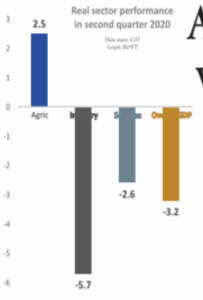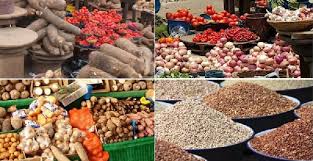It is the sector given the least support; it is the sector with the highest number of the aging workforce; it is the one that is least attractive to the youth.
But it is this same sector – agriculture – that has become the light of the economy, being the only sector to grow as the others are trumped by the pandemic’s impact.
While the other two sectors, industry and services, were decimated by impacts of the coronavirus pandemic as they experienced a contraction of 5.7 percent and 2.6 percent respectively, the ‘rejected stone’ – agriculture – didn’t succumb to the pressure but rather saw a growth of 2.5 percent in the second quarter, data released by the Ghana Statistical Service (GSS) have shown.
That the agriculture sector was able to withstand shocks of the pandemic is not mere serendipity, as the sector outperformed the other two in the first quarter of 2020 – growing by 5.9 percent, whereas industry and services both grew at 5.7 percent in the third quarter of 2019.
The last time that agriculture recorded growth higher than those two sectors was during the first quarter of 2014 when it grew by 8.2 percent while industry contracted by 9.9 percent and services grew by just 2.6 percent.
Despite the sector’s recent growth, its overall contribution to GDP is what has become of more concern.

It contributed a paltry 19 percent to the economy in the second quarter of 2020 while industry and services, which rather contracted, contributed 33 percent and 48 percent respectively – reflecting the fact that agriculture is no longer the economy’s backbone or considered the most important sector.
Dean of the University of Cape Coast Business School, Prof. John Gatsi, says the data should prompt managers of the economy to formulate policies that will make growth in other sectors automatically contribute to growth in the agriculture sector by promoting the value chain.
“I think what the entire data tells us is that we should be more inclusive in our economic management. From the data, agriculture seems to do well because the pandemic didn’t stop people from consuming agriculture products. It didn’t stop farmers and traders of agriculture produce from going about their normal business, because agriculture is a necessity. It tells us that if we are planning, then we should engineer our policies such that they promote agriculture across the value chain.
“The data show the information and communication sector also performed very well. So, what we can do is that we should take advantage of that sector and use it to support and revive agriculture. Some countries are using ICT to boost agriculture growth, so we can learn from them and do the same thing. It is not merely about allocating huge money in the budget to agriculture; we are talking about creating a viable investment attractive to both internal and external players,” he said in an interview with the B&FT.
It is fair to say that successive governments have introduced several interventions over the years to boost growth in the sector, the most recent being the Planting for Food and Jobs introduced by the Akufo-Addo-led administration in 2017. Even though the programme has achieved some success, which many attributes the recent performance of agriculture to, fundamental challenges still remain an obstacle to the full potential of the sector in economic growth.
One age-old challenge of agriculture in this country is rampant land litigation issues which threaten the investments of businessmen and eventually lead them to abandon lands they have acquired with huge capital. This has discouraged many private investors from pushing resources into the sector.
There is also the problem of poor road networks linking farming communities to towns and cities which are the main markets for farmers, resulting in post-harvest losses to the farmers.
Then, there is the issue of finance. Agriculture is still considered a high-risk sector in the finance industry, hence many banks and other financial institutions are cautious in lending money to the sector. It remains one of the sectors that receive less support from banks.
As a result of this, farmers continue to use outmoded methods of farming rather than modern methods involving mechanisation.
If these and other challenges blighting the sector’s prospects are addressed by both government and the private sector, then agriculture can be the game-changer in the country’s efforts to reset the economy after the coronavirus pandemic plunged it into ruin – which has resulted in a contraction of 3.2 percent for the second quarter, a situation the country has not experienced in almost four decades.
Source: bf&t








